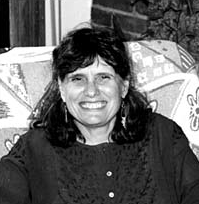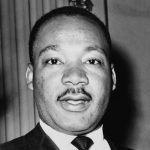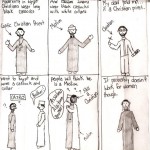 To start with, I do not have a position on whether formerly incarcerated Kathy Boudin should be teaching at Columbia University or not. At the end of this post, I will solicit your viewpoint.
To start with, I do not have a position on whether formerly incarcerated Kathy Boudin should be teaching at Columbia University or not. At the end of this post, I will solicit your viewpoint.
I normally do not begin my articles affirming my neutrality on an issue, because part of the stated mission of Stories Untold is to employ classic journalistic methods, which include being nuanced and as non-partisan as possible on any question that can be reasonably described as controversial. However, I consider it an act of responsibility to be very explicit about my lack of opinion here, because I have many indirect ties to the Boudin case. Let me lay them out. First, I am a student at the same university where she works, Columbia, in New York City. Second, my sister-in-law is a professor in the Teacher’s College of Columbia University, where Boudin received her doctorate in education. Third, I volunteer at Exodus Transitional Community in East Harlem, which helps recently incarcerated men and women re-integrate into society, based on the belief that everyone is capable of overcoming socioeconomic struggles no matter what stigma they face. Fourth, my brother is a former employee of National Review, one of the organizations which has criticized the hiring of Boudin by Columbia. Despite the various ties I have to institutions involved in the story, I am not convinced of either side on this question. There are strong cases for and against.
My purpose in this article is to try to characterize the new public discourse around Boudin’s case, and use what I have observed at Columbia to correct factual inaccuracies or common misleading claims. Because I am on the same campus as Boudin, and a journalist at Patheos, I take it as professional obligation to lay out as much new information as possible about the story, given the very good source access. [Update, April 18: I have now interviewed nine Columbia students about Kathy Boudin.] It is for this reason that I found Boudin’s 2004 essay for a journal published by the Fellowship of Reconciliation, an interfaith pacifist organization. In this article, Boudin describes her emotional reactions, while she was in prison, to her case, and the decisions she has made since she was convicted. I encourage you to read her essay, Making a Different Way of Life, now republished on Patheos. This piece of writing is important because with it, Boudin clearly, and publicly, expressed her remorse. This provides strong evidence against one of the major claims currently made against her: that Boudin does not have “the pretense of remorse,” as one commentator put it. [Update, April 16: Editorialists criticizing Columbia such as Mona Charen are still claiming that Boudin “has never expressed remorse“. Perhaps they have not read the article above, or perhaps they have, but do not consider it genuine remorse.] [Update, May 8: Boudin told Fox News directly that she was remorseful, but reporter Jesse Watters, speaking to Bill O’Reilly, said he didn’t believe her, because, he says, she hasn’t reached out to the victims, although Boudin, many years ago, said she has.]
Boudin is a former member of the Weather Underground, an American radical left organization which performed bombing attacks during the 1970s. In 1984, Boudin was convicted of murder for her participation in an 1981 ultimately-failed armed robbery in Nanuet, New York, which took the lives of a security guard in Nanuet and two police officers in nearby Nyack, north of New York City, in Rockland County [hat tip to reader Mb]. She was released from prison on parole in 2003, and in 2008, was hired as a faculty member at Columbia’s School of Social Work, where she currently is an adjunct professor teaching topics such as criminal justice.
Earlier this month, a number of media outlets “learned” that Boudin was teaching at Columbia. This was, in fact, public knowledge since 2008. The first outlets to bring up the case were the New York Post and Fox News (both owned by News Corporation):
New York Post, April 2:
…[Boudin] now holds a prestigious adjunct professorship at Columbia University’s School of Social Work, The Post has learned.
Fox News, April 2:
The New York Post reports that Kathy Boudin’s return to respectability after her 2003 parole occurs a week before the release of Robert Redford’s “The Company You Keep,” a movie loosely based on the $1.6 million heist.
Although the story is not new, Fox, in journalistic terminology, “pegs” the story to Robert Redford’s new film. How can one claim that Boudin has only just now returned “to respectability”? Is that a judgment that can be made with any factual certainty, and can be attributed to a specific date? Perhaps she was respectable in many people’s eyes long before the release of Redford’s film. Or perhaps she remains generally not respected — but at least at Columbia, she has mostly been praised by students and treated like any other faculty member. In any case, for the vast majority of people, even formerly incarcerated, their general respectability is nearly impossible to judge. We do not have enough information.
Other outlets have described Boudin’s life as “comfortable” or “cushy”, because she is an adjunct professor at Columbia. News12HudsonValley:
Boudin has been out of prison for a decade and is living a comfortable life working as an assistant professor [sic] at Columbia University.
An assumption there is that being an adjunct professor at Columbia yields a cushy life. Adjunct professors do not work full-time, and even full-time professors do not necessarily lead comfortable lives in a city as expensive as New York. Whether someone’s life is comfortable is very much a function of other circumstances; if a tenured professor has, for example, liver cancer, we may not be able to describe his or her life as cushy. Of course, few formerly incarcerated felons get teaching posts at Ivy League universities — so in comparison, Boudin’s job may seem “cushy” — but we just don’t have enough information to make that determination.
After the Post article, Rockland County leaders began to criticize Columbia for employing Boudin. Pearl River Patch quotes legislator Ed Day:
Kathy Boudin should never have been paroled in 2003, and she certainly should not be educating students. She was directly responsible for the deaths of those police officers, asking them to lower their weapons so her compatriots could ambush and kill them, and she was only eligible for parole at all because she managed to cop a plea deal.
The claim that she asked the police to lower their weapons is in dispute.
Nyack-Piermont Patch printed a letter from the president of the Rockland County Police Benevolent Association, James Kelly, to Columbia President Lee Bollinger. Kelly characterizes Boudin in the same way that many commentators have been doing recently, namely, that she is the same person that she was 30 years ago. And he also repeats what we have heard elsewhere: that her employment has increased the suffering of the families of the victims.
Mr. Bollinger, my question to you is why? Why would you employ a radical, terrorist [sic] who was directly responsible for the deaths of two police officers? Why would you remotely believe that letting a convicted murderer not only revel amongst your students, but ask her to guide and shape young, impressionable minds is a responsible decision for a college administer [sic]? Why do you feel it necessary to tarnish the memory of these heroic men by hiring a murderer? Why would you needlessly cause the families of these brave men any more pain and suffering that they have already endured?
To describe Boudin as a “radical, terrorist” is to assume that she currently holds radical views or is involved in terrorism. I have seen her so far to do neither on the Columbia campus. So we don’t have enough evidence to make this claim [Update, April 25: I have asked students about her views.]. Furthermore, we don’t know on the whole what the victims’ families think of Boudin’s appointment. Given the remorse she has expressed for her crimes, and the very tangible understanding she has of being a criminal, she may be uniquely able to instruct Columbia students to avoid going down a similar path as she. The families may recognize this and some may even support Boudin’s being on the faculty. One survivor, Arthur Keenan, has spoken out against Boudin’s faculty position. But he many not represent all the families.
Some critics have pointed out that Boudin last month said in a speech at NYU that “we want them here with us, and hopefully someday they will be“, referring to others involved in the robbery who are still in prison. This could be interpreted as a statement in favor of a radical political stance, or that Boudin wishes their company when they are freed from incarceration, or both, or something else.
Again, we do not have enough information.
Legislators in Orangetown, New York, near Nanuet, then voted to condemn Columbia for the decision. The meeting was recorded and reported upon by Nanuet Patch. Councilman Thomas Diviny:
Columbia University is one of our neighbors. They have the Lamont-Doherty facility in Sparkill [sic; it is actually in the hamlet of Palisades], and they haven’t really been a good neighbor by ignoring the sensitivities of this community regarding Kathy Boudin, and the murders that occurred, and the loss of life to Sergeant Edward O’Grady, Police Officer Waverly Brown, and Brinks security guard Peter Page.
The legislators are assuming that Columbia University is ignoring the sensitivies of Orangetown residents. In a 2003 editorial about the hiring of Boudin at St. Luke’s Hospital, an academic affiliate of Columbia, the university newspaper wrote: “It is true that Boudin’s presence [at Saint Luke’s] brings great pain to many, and their pain should be acknowledged.” On the whole, Columbia students and faculty (like most human beings would) have expressed sadness about the impact of the crime on Orangetown, so it’s a stretch to say that the Columbia community is ignoring its sensitivities. If Diviny is making the narrower claim that just those who hired Boudin were insensitive, then he cannot concurrently call them his neighbors, because the School of Social Work has little to do with the Lamont-Doherty facility, which is run by the Earth Institute, which researches environmentally sustainable development and the world-wide elimination of poverty and disease. The most charitable reading, perhaps, is that Diviny is just upset with the highest-level decision-makers at Columbia, such as Bollinger; but his words then could mislead people into thinking he is implicating the university at a broader scale.
More outlets began to launch intense criticism, some of it with threatening overtones. (Perhaps they consider this appropriate given that Boudin was once convicted of a murder.) Much of it was targeted at “liberals”, a label attached to Columbia.
Bill O’Reilly, April 7:
Ms. Boudin better hope she doesn’t run into me on the streets of New York.
Jay Nordlinger at NationalReview.com:
I’m not sure I have the full answer on American liberals and the violent Left. But I do know that some liberals will always defend, excuse, and honor these people — for example, by giving them prestigious jobs in universities.
Elie Kedourie once had some advice for David Pryce-Jones: “Keep your eye on the corpses.” It is good advice. It applies not only to genocidal killers such as the Khmer Rouge, but also to smaller fry such as Kathy Boudin and her gang: Keep your eye on the corpses.
Columbia is a university with a diverse range of viewpoints and a large, international faculty and student body. The overall constellation of political views of Columbia’s students, staff, and faculty does not fall cleanly into the “liberal-conservative” spectrum that is often said to be present in the U.S. It is thus very much an inaccurate reduction to claim that Boudin’s hiring was made by “liberals [who] will always defend, excuse, and honor [the violent Left].”
Furthermore, some self-identified liberals on campus have also been critical of Columbia’s decision. I have heard them make the case that Boudin’s Caucasian, relatively wealthy background allowed her access to a job that a person from another socio-economic category would not have, and that her hiring was thus discriminatory.
Non-Columbia-affiliated self-identified liberals have also spoken out against Columbia’s decision. A commenter at Daily Beast:
I’m highly liberal and well educated, and I think this is messed up. Yes, by all means give criminals that have served their time the benefit of the doubt, regardless of whether the nature of the particular crime horrifies. However, do we truly believe that every single one of these people has reformed, and since earned these distinguished positions? I know and love plenty of radicals, and I don’t.
A more thorough characterization of the case can be found the a 2001 New Yorker profile piece, by Elizabeth Kolbert, while Boudin was in prison. Kolbert was not entirely sympathetic toward Boudin. It is worth reading simply for the startling amount of detail.
Even if one accepts Boudin’s version of events, her interpretation of them is problematic. In spite of everything that has happened, she still wants to see herself as a fundamentally good person. Inevitably, this leads her — against her will, even — to something that can sound dangerously close to evasion. “I was responsible for not being responsible,” she told me at one point, a formula she clearly intended to acknowledge her culpability, but which also had the effect of denying it.
Yesterday Rush Limbaugh also mentioned the case:
And Columbia University just hired a convicted terrorist, right? Yeah, Weather Underground, Kathy Boudin. She’s a murderer.
“Just” is an unusual choice of words to describe someone who has been teaching at the school for five years.
Another commenter at NYULocal repeated a claim that we have seen quite a bit in the discussion:
The issue is that they honored an unrepentant terrorist and cop-killer. She has never apologized to the three wives she widowed and the nine children she left fatherless.
This seems to be in dispute, given what Boudin wrote for FOR:
I want to know about that suffering, to face the anger, to say “I am sorry,” because those words are the only ones we have to ask for forgiveness. Offenders are not supposed to contact victims of their crimes. Sometimes the unexpected makes possible this human contact. One of the victims of my crime and I met because we were both involved in the AIDS crisis. She told me her experience of that ghastly day: a gun stuck at her head, her eighty-year-old mother pushed out of her car, which had been commandeered. She testified against me and all who were arrested, a witness for the prosecution for three long years, and proud that she had helped to put everyone in prison. She asked me questions, and visited year after year. She allowed me to hear the consequences of my acts and to apologize.
So the majority of websites, TV stations, radio commentators, and so forth, have been either critical or neutral. Those defending the university have largely been commenters, not media outlets.
Just what is this all about, anyway? Columbia decides to put an old radical on the faculty. Either she makes a valuable contribution to the life of the institution or she doesn’t. What happened in the past is past: She was convicted, imprisoned and paroled. What matters is what she contributes now. For what it is worth, I wouldn’t expect much, but if it satisfies Columbia that is their business.
So should all ex-cons be unemployed and unsuccessful? Is prison not an avenue for rehabilitation? This article from NYU’s ‘forward thinking’ voice smugly reeks of the ideology that there are people not worth understanding and uses an obnoxious non factual literary voice to suggest that even when someone has proven themselves to be a valuable member of society, their past should still be scrutinized (and only for its violent aspects not for the political issues which motivated them which they probably understand/teach in a civil and successful way now).
I have only run across one article in a major media outlet which has criticized the latest coverage of Boudin. [Update, May 5: Jim Anderson of the Iron Mountain Daily News has now defended Columbia in an editorial.] Crooks and Liars has analyzed Fox’s approach :
Any smart Fox-watcher knows where they’re going with this. It’s nothing more than their latest attempt to undermine universities.
I am not an expert in Fox News‘ editorial strategies. However, Crooks and Liars’ claim that it’s “nothing more” may be false — especially given that, as we observed earlier in this article, Fox directly pegged Columbia and Boudin to Redford’s new movie. It could be that Fox has multiple reasons for now raising objections to Boudin’s teaching position.
Here are more things I can report, being on the ground at Columbia:
– Boudin seems to have not, in the last five years, taken any actions to indicate that she would repeat a violent crime.
– Of course, Boudin’s background has been the subject of discussion at Columbia. However, her presence here has not caused great controversy, either within or outside the university, over the last five years.
I will be updating this article as I gather more information.
My colleague Thomas McDonald at Patheos, who asked (to my admitted fear) whether a “drone strike” could be launched at Columbia, has also called for something akin to what I will now propose: an factually accurate and conceptually nuanced discussion about whether Boudin’s five years of employment are justified.
Disgusting as I find the presence of Boudin–and Ayers, and Dohrn–among the American intellectual and political elite, American greatness is measured in part by our ability to conduct this kind of debate in the sunlight.
What is your opinion?
















